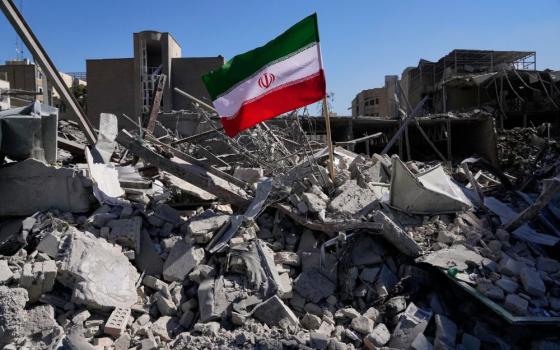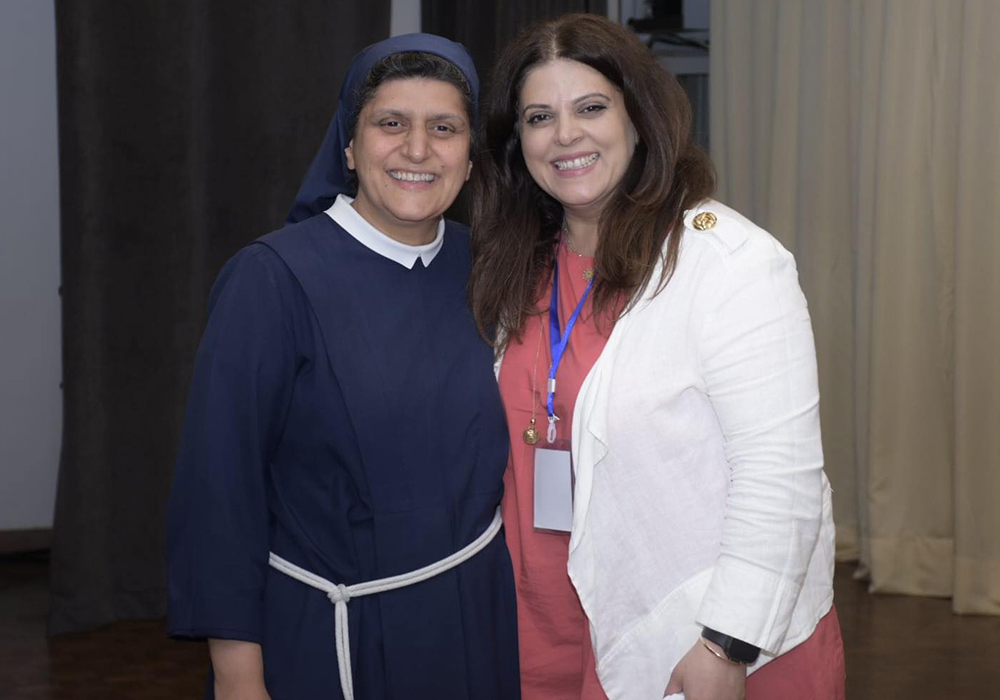
Sr. Rose Hanna is pictured at an event of the Association Libanaise de Thérapies comportementales et cognitives, or Lebanese Association of Behavior and Cognitive Therapy (ALTCC). Hanna was present at the ALTCC Annual Conference at Hôpital Psychiatrique de la Croix entitled "War and Peace: Adaptive Strategies." (Courtesy of ALTCC)
Perched on a hill north of Beirut, in Jal el‑Dib, Lebanon, the Hôpital Psychiatrique de la Croix (Psychiatric Hospital of the Cross) is directed by Sr. Rose Hanna of the Franciscan Sisters of the Holy Cross.
The hospital was founded in 1919 by Blessed Khalil Haddad "Father Jacques," who transformed it into an asylum in 1937 and later into a psychiatric hospital in 1951. According to the hospital website, the cross of the hospital watches over the vast horizon, blessing and protecting those who seek its intercession.
Father Jacques, also known as Abouna Yaacoub, taught the Sisters of the Cross to turn to the cross first through prayer and to people through service and compassion, giving preference to the most disadvantaged.
The hospital survived multiple wars and occupations and "was even able to expand to address the growing needs of a stressed population," according to the American Journal of Psychiatry. Through the years, it has served as a safe place for refugees and people from neighboring countries, earning itself a reputation as non-partisan.
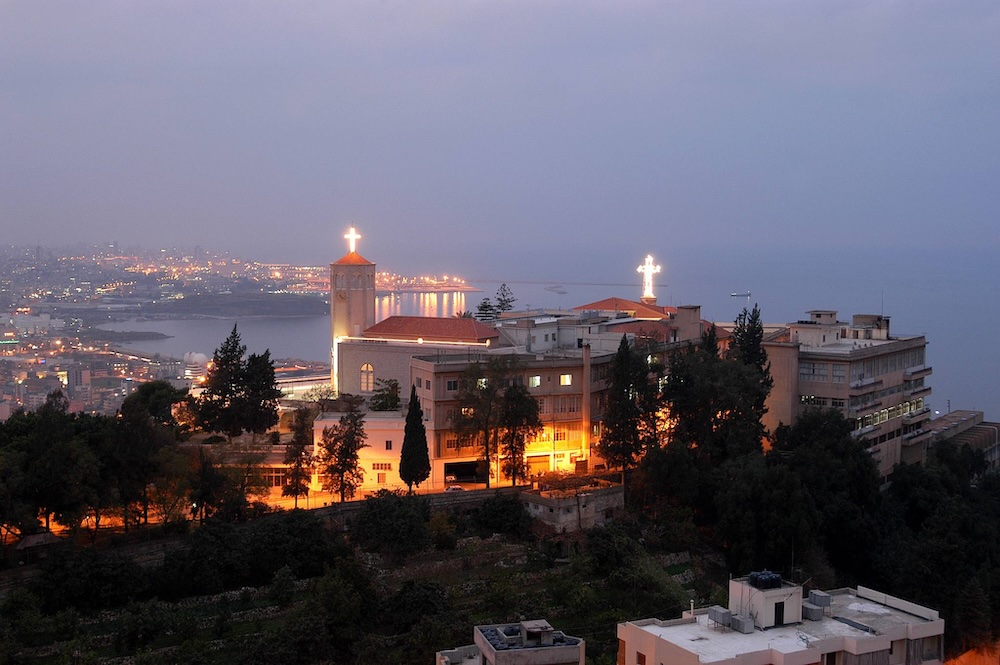
Aerial view of Hôpital Psychiatrique de la Croix (Courtesy of Hôpital Psychiatrique de la Croix)
"Solidarity, even on a small scale, can change lives," said Hanna. "We believe that compassion can cross borders and break down indifference."
Today, the hospital is one of the largest psychiatric hospitals in the Middle East with 263 employees, "all committed to the same vision: to accompany the suffering person with competence, respect and compassion," said Hanna. It also offers conferences for health care professionals and students "to raise awareness, educate, and break down taboos surrounding mental health."
Hanna, who has been the director of Hôpital Psychiatrique de la Croix for two years, spoke to Global Sisters Report about how the hospital is managed and what it provides for the community.
GSR: What is your role at the Hôpital Psychiatrique de la Croix?
Hanna: My mission is to ensure the smooth running of the establishment, quality of care, respect for patients' dignity, and the transmission of the human and spiritual values of the Franciscan Sisters of the Cross and of our founder, the venerable Abouna Yaacoub [Father Jacques].
Can you tell us what your daily tasks are?
My days are very diversified. They include supervising the medical and administrative teams, managing resources, coordinating development projects and, in some cases, monitoring patients. I also try to stay close to the staff and patients, by being present and listening.
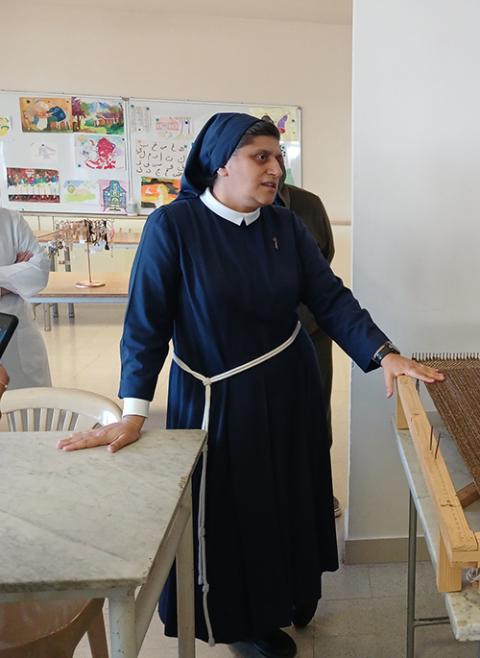
Sr. Rose Hanna, director of Hôpital Psychiatrique de la Croix, is pictured during her daily tasks at the hospital. (Courtesy of Hôpital Psychiatrique de la Croix)
What kind of activities are available for the patients of the hospital?
Our patients benefit from several types of therapeutic activities: art therapy, music therapy, occupational therapy, adapted physical activities, as well as spiritual celebrations for those who wish, such as the daily rosary and weekly Mass. These activities are designed to promote self-esteem, emotional expression and social reintegration.
And of course, our patients benefit from a variety of theatrical activities: singing, stage expression, talent development, and even dance, supervised by a professional choreographer. These activities bring real benefits, both psychologically and in terms of relationships and emotions.
What is your favorite activity to do with patients?
When time allows, I particularly enjoy taking part in art workshops or the choir. These are simple but profound moments, where we discover the inner beauty of people beyond their illness. Direct contact with patients reminds me every day of the meaning of our mission.
Why is the hospital considered one of the largest psychiatric hospitals in the Middle East?
Hôpital Psychiatrique de la Croix is recognized not only for its capacity, which exceeds 800 beds, but also for the quality and diversity of the care it offers. It is one of the few establishments to combine psychiatric care, human support, rehabilitation and spiritual care. It welcomes patients from all over Lebanon and sometimes from neighboring countries.
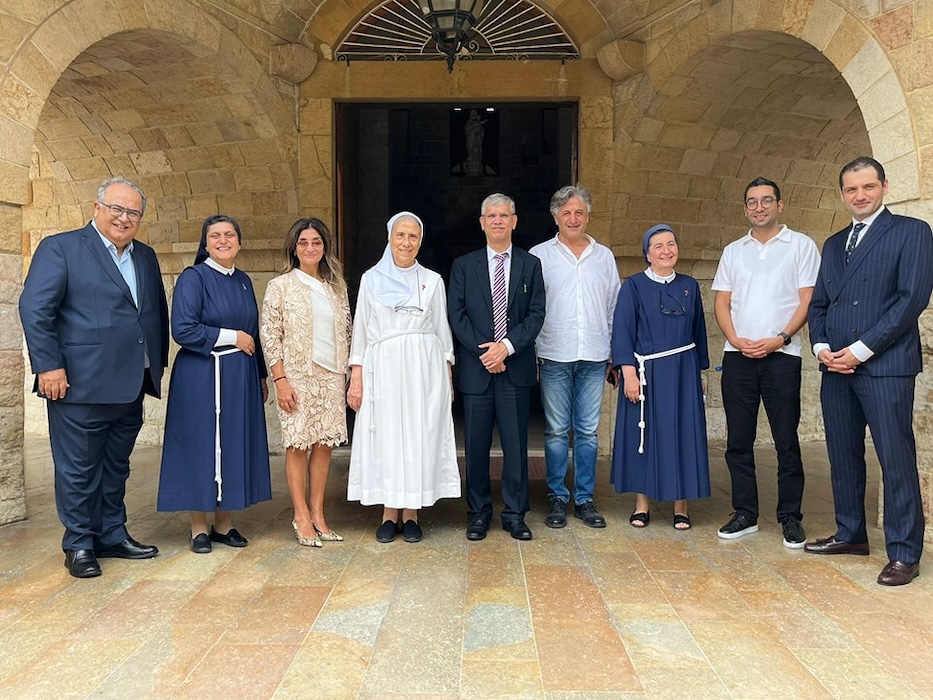
Visit of the ambassador of Pakistan, Salman Athar, and his collaborators to the Hôpital Psychiatrique de la Croix in Jal el‑Dib, Lebanon. Present were Mother Mary Makhlouf, superior general of the Franciscan Sisters of the Cross, Sr. Rose Hanna, director of the hospital, and Sr. Mary Youssef, general secretary of the hospital. The ambassador wanted to hear about the difficulties that the hospital is currently facing amid the economic and social crisis in Lebanon. (Courtesy of Hôpital Psychiatrique de la Croix)
Is your team made up entirely of sisters, or are there laypeople too?
The team is mixed. The Sisters of the Cross play a fundamental role in human and spiritual accompaniment, but we work closely with highly qualified lay professionals. This complementarity is an asset.
Can you please tell us who makes up your team?
Our team is multidisciplinary. It includes psychiatrists, psychologists, specialized nurses, social workers, care assistants, therapeutic facilitators, physiotherapists, art therapists, as well as administrative and technical staff.
How do sisters get involved within this multidisciplinary team?
The sisters are involved in the day-to-day life of the hospital. They take part in patient care, liturgical celebrations, administrative and educational tasks, and provide a discreet and precious fraternal presence. Their mission is to be witnesses of hope at the heart of human suffering, as our founder demands.
Advertisement
What's one of the biggest emergencies you've dealt with during your service?
There have been a number of difficult situations in recent years, including the fire that broke out in the vicinity of the hospital in 2020 and the explosion in the port of Beirut. These events deeply affected our patients and staff, both physically and psychologically. We have had to cope with a sudden increase in mental health needs, while managing already very limited resources. Added to this was the persistent economic crisis in Lebanon and, more recently, the repercussions of the war in the region.
Through it all, our staff have demonstrated remarkable courage, unwavering commitment, and a deep sense of mission.
Do you have programs where you train nursing students?
Yes, every year L'Hôpital de la Croix welcomes students in nursing, psychology, social work and other health disciplines. We firmly believe in passing on knowledge and learning by doing. These young professionals benefit from theoretical and practical training, supervised by our experienced teams.
What is the philosophy of the Franciscan Sisters of the Holy Cross concerning patients at the hospital?
Our philosophy is based on the conviction that every person, whatever their mental suffering, retains an inalienable dignity. We seek to reveal the light within each person. The patient is welcomed as a brother or sister, in a spirit of love, respect and mercy, inspired by the Gospel and the example of the compassionate Christ, and by the spirituality of Abouna Yaacoub.
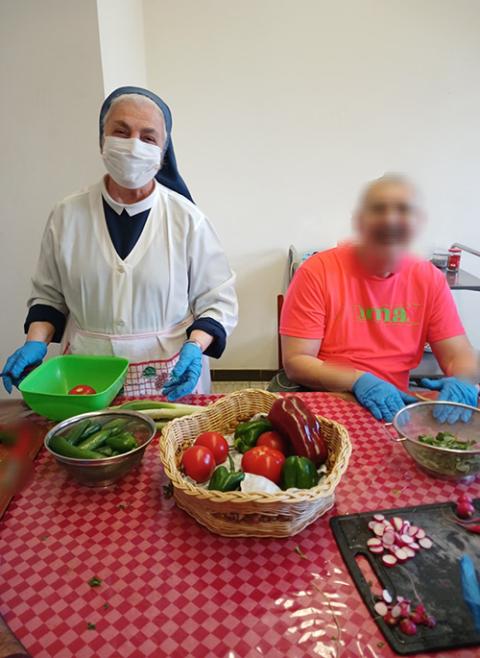
The culinary activities organized by the sisters and staff with psychiatric patients offer much more than just a cooking workshop. They allow patients to express themselves, have fun, feel valued, and enjoy moments of sharing. (Courtesy of Hôpital Psychiatrique de la Croix)
How does the hospital incorporate art therapy?
Art therapy is one of the pillars of our therapeutic approach. It enables patients to express themselves in ways other than speech, which is often difficult in times of crisis. Through drawing, painting, music, culinary arts, and bibliotherapy ... they can rediscover a form of identity, creativity and dialogue with themselves and others. It's an invaluable tool for inner healing.
How are the Franciscan Sisters of the Holy Cross responding to the mentally ill in Lebanon presently?
The Sisters of the Cross are present in several establishments in Lebanon. Through the Hôpital de la Croix, schools, and other places of mission, they accompany people in mental distress, especially the poorest. Their presence is both caring and spiritual: They listen, support, pray and work for a more just and welcoming society for the mentally ill.
How do you organize your efforts in a climate of humanitarian and economic crisis in the country?
The current crisis in Lebanon makes our mission even more difficult, but also more urgent. We are redoubling our efforts to maintain the quality of care, despite inflation, the flight of professionals and power cuts. We rely on partnerships, donations, humanitarian projects and the support of our congregation to continue to serve with hope.






